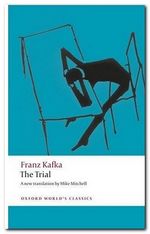Kafka’s one completed novel masterpiece
The Trial was the only novel Kafka ever more-or-less completed during his own lifetime. Most of his other work is renowned for being fragmentary and incomplete. But even so, its chapters were kept in separate folders and he gave no indication of the order in which they were to appear. The parts were assembled and published by his friend Max Brod in 1925, the year after Kafka’s death. It is a novel which seems to give an amazingly premonitory account of the horrors in the modern totalitarian world.
 It deals with the arbitrary nature of power threatening the freedom of the individual and the crushing of every attempt to understand its workings. The novel opens with a sentence which has become famous – heralding the nightmare to come: “Somebody must have been telling lies about Joseph K, for one morning without having done anything wrong, he was arrested.” This is the ‘knock on the door’ which was to become an everyday experience for millions in the years that followed in the totalitarian worlds of Stalin’s Russia and the Nazi period of German’s history. Needless to say, it has also become commonplace throughout the world ever since – from Franco’s Spain and Pinochet’s Chile to China, North Korea, and today’s middle-East.
It deals with the arbitrary nature of power threatening the freedom of the individual and the crushing of every attempt to understand its workings. The novel opens with a sentence which has become famous – heralding the nightmare to come: “Somebody must have been telling lies about Joseph K, for one morning without having done anything wrong, he was arrested.” This is the ‘knock on the door’ which was to become an everyday experience for millions in the years that followed in the totalitarian worlds of Stalin’s Russia and the Nazi period of German’s history. Needless to say, it has also become commonplace throughout the world ever since – from Franco’s Spain and Pinochet’s Chile to China, North Korea, and today’s middle-East.
Joseph K’s offense is never explained to him, and the illogical nature of his helplessly vulnerable condition is pursued relentlessly throughout the narrative. Indeed, it gets worse with each of his efforts to understand or do anything about it. He appeals to all forms of bureaucratic authority for help and clarification, but gets nowhere.
Of course, no trial in the ordinary sense of that word takes place. He never discovers the precise charge which is made against him. Once he is arrested, an examining magistrate inquires into the case against him – and the process [Der Prozess is the German title of the novel] gradually merges into the verdict.
Joseph K visits a number of people and even the court itself in pursuit of his self defense. Every venue seems more bizarre than the last. A courtroom which is more like a madhouse; a lawyer’s office which seems more like a derelict cathedral; and a painter’s studio which is packed with lubricious young girls.
Many possible interpretations of the story have been discussed at length in the critical writing on Kafka. First there were the religious and existential approaches to explain why Joseph K feels guilty, even when he doesn’t seem to have done anything wrong. Then the psychoanalytic and biographical theories, based on guilt about his family or his fiancee Felice Bauer to whom he was twice engaged. Western Europeans favoured the existential approach, whereas the old Eastern bloc countries understandably read Kafka as expressing the fate of the individual denied freedom by bureaucratic tyrannies. Both approaches can be equally convincing, and more are possible.
These new editions of Kafka’s main works from Oxford University Press offer fresh translations, and they come with extended introductory essays, full explanatory notes, a bibliography, and both a biographical preface on Kafka and a chronology of his life. They also explain the very complex provenance of the text, and included as a bonus are fragments from the novel discovered amongst Kafka’s papers after his death. Generations of scholars have been unable to decide exactly where they belong in the novel, so they are offered as appendices.
This is one of the key texts in early twentieth century modernism. Kafka was unlike any other writer before or since (even though he has many pale imitators). If you have not read Kafka before, it’s probably better to start with some of his short stories – such as Metamorphosis. When you’re ready, this novel will be waiting for you – like a nightmare ready to happen.
1962 film version – directed by Orson Wells
© Roy Johnson 2009
Franz Kafka, The Trial, Oxford: Oxford University Press, 2009, pp.191, ISBN: 0199238294
More on Franz Kafka
More on the novella
More on literary studies
More on short stories